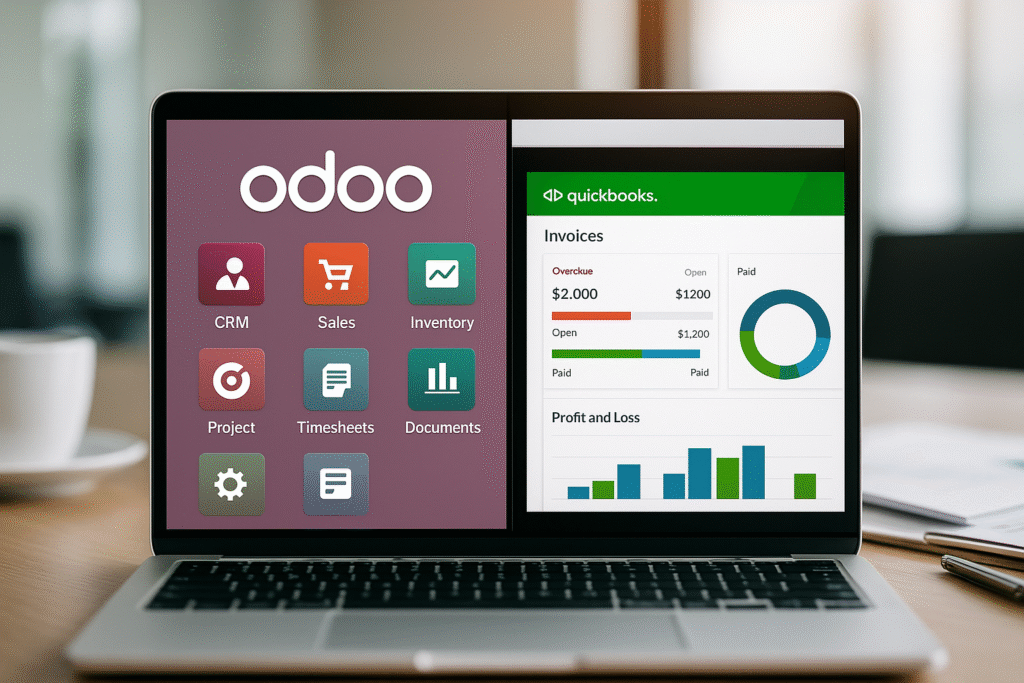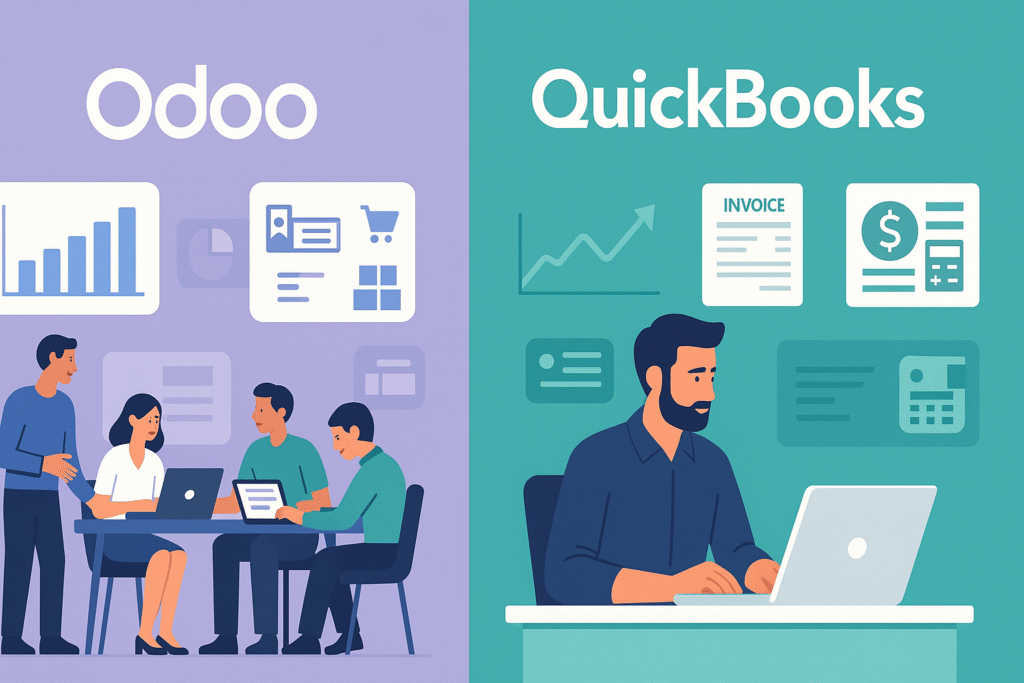Introduction
When it comes to managing business finances, choosing the right software is more than just picking a tool — it’s choosing the backbone of your operations. Two popular names dominate this space: Odoo and QuickBooks. While both are powerful, they cater to different needs and business sizes.
This guide explores Odoo vs QuickBooks in detail, helping you decide which one truly fits your company’s goals — whether you’re a startup, an established SME, or a growing enterprise.
Table of Contents
1. Understanding the Platforms

1.1 What is Odoo?
Odoo is an open-source Enterprise Resource Planning (ERP) platform offering an all-in-one suite of applications. Beyond accounting, it covers CRM, sales, inventory management, HR, project management, eCommerce, and more.
It’s highly customizable and scalable, making it ideal for businesses with complex workflows or expansion plans. Deployment is flexible — you can choose cloud hosting or keep it on-premise.
1.2 What is QuickBooks?
QuickBooks is primarily an accounting software designed for small to medium-sized businesses. It focuses on core financial tasks such as bookkeeping, invoicing, payroll, bank reconciliation, and tax filing.
QuickBooks is known for its ease of use, making it perfect for non-accountants who want simple, reliable financial management without the steep learning curve.
2. Core Differences Between Odoo and QuickBooks

2.1 Scope & Functionality
- Odoo: Full ERP suite integrating accounting, CRM, HR, inventory, and more.
- QuickBooks: Primarily focused on accounting and finance management.
2.2 Accounting Features
- Odoo: Handles both basic and advanced accounting, including multi-company setups and advanced reporting.
- QuickBooks: Specializes in easy bookkeeping and tax preparation.
2.3 Inventory Management
- Odoo: Advanced multi-warehouse management, batch tracking, reordering rules.
- QuickBooks: Basic inventory tracking — enough for small retail or service businesses.
2.4 CRM & Sales
- Odoo: Built-in CRM for lead tracking, sales pipelines, and customer interaction.
- QuickBooks: No native CRM, relies on third-party integrations.
2.5 Customization & Flexibility
- Odoo: Open-source, modular, unlimited customization.
- QuickBooks: Limited customization but supports add-ons.
2.6 Deployment & Accessibility
- Odoo: Cloud or on-premise.
- QuickBooks: Cloud-based and desktop options available.
2.7 User Interface
- Odoo: Modern design but requires training to master.
- QuickBooks: Very beginner-friendly and intuitive.
2.8 Pricing
- Odoo: Free Community version + paid Enterprise plan based on modules and users.
- QuickBooks: Subscription tiers for cloud and one-time license for desktop — generally more affordable for small setups.
3. Ideal Use Cases
3.1 When Odoo is the Better Choice
Odoo shines for:
- Businesses needing all-in-one ERP solutions.
- Multi-department or multi-location organizations.
- Companies with complex inventory and CRM needs.
- Enterprises anticipating rapid growth.
3.2 When QuickBooks is the Better Choice
QuickBooks is best for:
- Small businesses and startups.
- Entrepreneurs needing simple accounting tools.
- Businesses that want quick setup and minimal training.
- Owners prioritizing affordability.
4. Strengths at a Glance
4.1 Key Strengths of Odoo
- Comprehensive, integrated business management.
- Scalable for growing businesses.
- Strong inventory and CRM features.
- International and multi-entity support.
4.2 Key Strengths of QuickBooks
- Extremely user-friendly.
- Reliable bank reconciliation and tax filing.
- Affordable for small business budgets.
- Strong support for payroll and invoicing.
5. Side-by-Side Comparison Table (Odoo vs QuickBooks)
| Feature | Odoo | QuickBooks |
| Scope | Full ERP suite | Accounting-focused |
| Accounting | Basic to advanced | Simple, efficient |
| Inventory | Advanced multi-warehouse | Basic tracking |
| CRM | Built-in | Requires integration |
| Customization | Unlimited (open-source) | Limited |
| Deployment | Cloud & on-premise | Cloud & desktop |
| Interface | Modern, complex | Simple, intuitive |
| Pricing | Free + paid modules | Tiered subscription |
6. Conclusion: Is Odoo Better Than QuickBooks?
The truth is, neither is universally “better” — it depends on what your business actually needs.
- Choose QuickBooks if you want straightforward, hassle-free accounting that you or your staff can start using right away.
- Choose Odoo if you need a highly customizable platform that handles more than just accounting — a tool that grows with your business.
Both have strong reputations and loyal user bases. The right choice comes down to whether you’re buying just an accounting tool or an entire business management ecosystem.
💡Bookmark this Odoo vs QuickBooks guide to share with your friends and help them choose the right software.
7. Further Resources (Odoo vs QuickBooks)
For deeper insights, check out:
❓Still unsure whether Odoo or QuickBooks is right for you? 📞 Call our experts today and get personalized guidance to choose the perfect software for your business needs.











